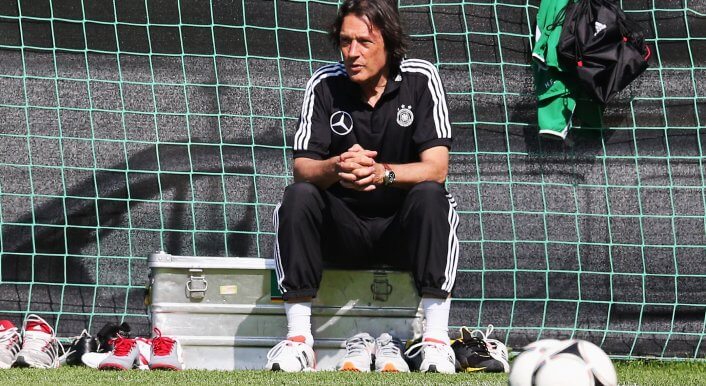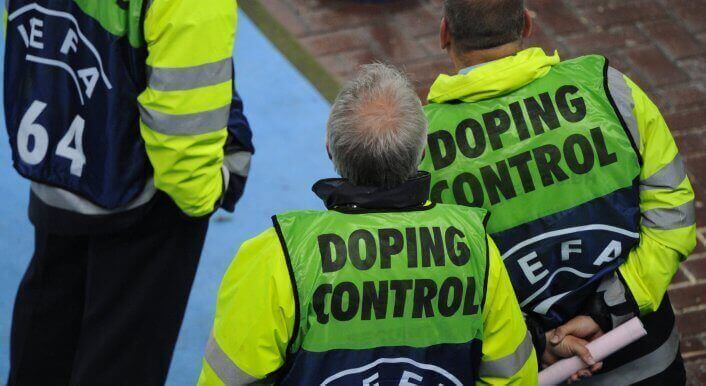Painkillers in football: „Squeezed like a lemon“
Is it impossible to compete in professional football without painkillers, Ingo Froböse?

Is it impossible to compete in professional football without painkillers?
Ingo Froböse: Football is on the upper edge of it’s capacity. Take the players who play the European Championships: They played already 60 to 70 games. If there is another highlight to come, that’s not possible without physical damages. Regeneration gets shorter and shorter, the body fights back and players have to take painkillers to supress the symptoms. We see that more frequently than ever.
What does that do to the players?
Froböse: Pain is a warning signal and it serves to protect the body from new damages. If I ignore these signals long-term this might develop long-term problems, for example knee- or ankle-damages. 25 percent of all injuries aren’t properly cured. Especially in Champions Leaugue, where the biggest stars play. 60 percent of all footballers don’t regenerate sufficiently. So they have to take these meds.
Why do you know that? Did you do any studies?
Froböse: We did a lot of surveys. Football is of course a closed shop, they don’t let anyone have a look through the door. Especially no one who talks to outsiders. Nonetheless we got insider informations from players. We talked to trainers and advisors, mostly anonymous. We don’t get broad statistics, which is a pity. But we observe recurring injuries. We look suspicious over footballs shoulder.
What do people tell you regarding your critical comments?
Froböse: We don’t get any pressure from anyone, but the closed shop is getting even closer. That’s a real shame. Our university is publicly financed and if we see sport as a model for our society, we scientist have the task to bring up this painful subject. That’s not honoured from the football-community and we notice that.
What sould be done to diminish the abuse of painkillers?
Froböse: The econonmical pressure would have to decrease. The players are no longer humans, they are products, goods. The athletes sell themselves with lock, stock and barrel. But it’s not important to amass a lot of money in a short time, it’s important to have longterm quality of living, including health. I personally know a lot of former players who are really annoyed about what has been done to them while being a professional. I would like to communicate this possibility to reflect their own lives to younger, still active players. Only these still active athletes can change something.
Are there any players who would stand up for this in public?
Froböse: There is a code of honor in professional football: You don’t tell anything from inside to an outsider. But there is of course a bunch of players we talk to who became sports invalides and who get a therapy now. Because they have to aknowledge: It’s not working any longer. I know a lot of players who can’t go for a walk with their kids, because their old crocks are busted. It’s important to enlighten the younger players. There are some former professionals who talk to younger athletes, but only in dialogue. They would never do this in public.
Do these examples scare young players?
Froböse: No, the economic pressure, the pressure from trainers and managers pushes players to act short dated. Players get uplifted. To lose that would be very harsh. There is a trainer in German Bundesliga who is such a dominant man, that players don’t get informed which injury they have. The trainer is the master of all knowledge. So players can’t know which problems they will face long-term. Players are played for a sucker. These ruling attitude is a big, big problem.
Football players don’t seem to have a healthy job.
Froböse: The body of football players gets exhausted, squeezed like a lemon. For economic reasons everyone tries to achieve the maximum. Every job has designated basics of occupational medicine, but there are none in football. That has nothing to do with occupational safety, to the contrary. You suck an organism until it’s over.
Often team physicians are the only contact for the players, there is no second thought on injuries. Is this a problem?
Froböse: We have something like a guru-system in sports. These gurus have such a big influence on athletes that there is a kind of enslavement. Therefrom results are singleminded opinion making, because a second opinion doesn’t exist. That’s really dangerous. Every high-performance athlete hunts every knickknack to get better. So a lot of charlatans get really busy. There is no controlling, no quality management. Controls could be second or third opinions.
Ivan Klasnic, who played long years in German Bundesliga and Premier League, needed a new kidney and sues now Werder Bremen and its team physician Götz Dimanksi. How do you judge this case?
Froböse: I think the Klasnic-case wouldn’t have been possible if the involved persons would have followed a normal medical codex. And if you would have accompanied this with reputable opinions from outside. I think it’s a homemade problem of the club – unfortunately to the damage of Klasnic.
How does the story of Ivan Klasnic end? Do you have an assumption?
Froböse: It depends which pre-existing defect a player had. It will be difficult to ascribe the kidney failure completely to the treatment of Götz Dimanski and Werder Bremen. I think it will not end well for Klasnic. But the case shows the problem: There is a player who got ruined for the sake of his club. Klasnic will suffer his whole life because of this. That’s disastrous.
International tournaments like the European Championship succeed a long season, games are closely clocked. Is the abuse of painkillers even higher than normal?
Froböse: Through the hype the burden for players increases extremely, not only physical, even mentally. The mental tension has immediate consequences on the bodies. I feel certain that clubs and players have to stand Sam – not the national team. The teams use all methods to get over the injury-problems during these tournaments. You can manage these three weeks somehow: You can make it for your nation. I think that the national leagues pay the piper in the first months of the new season.
The Interview originally was recorded in German last summer before the European Championship in Poland and Ukraine. We updated some minor passages.
A short videotalk with Ingo Froböse (in German, Sorry)



